Tinhorn's Daughter (6 page)
Read Tinhorn's Daughter Online
Authors: L. Ron Hubbard

“Oh, Jigs,” said Mary Ann, “I never saw anything so wonderful in my life! To fool them into thinking you were wounded and then beating them up and then getting fifteen hundred and forty-five dollars ⦔
“I didn't fool them,” said Gilhooly, tenderly regarding his leg. “But say, you know that guy Ivanhoe?”
“Yes, Jigs?”
“He was a fake.”
“What?”
“Yeah, why the dickens didn't you tell me that bein' romantic was just beatin' up guys with your bare fists? You'd a saved me a pile of trouble.”
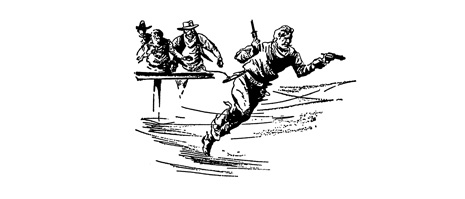
Story Preview
N
OW
that you've just ventured through some of the captivating tales in the Stories from the Golden Age collection by L. Ron Hubbard, turn the page and enjoy a preview of
Branded Outlaw.
Join Lee Weston, who's blamed for rustling cattle. He's almost lynched, but will stop at nothing to find his father's killer
â¦
until he's framed for shooting the father of the only girl he's ever looked at more than once!
Branded Outlaw
A
leather-faced, sun-dried individual with a star on his chest was drowsing over a stack of reward posters, waking up occasionally to swat at a fly which buzzed around his ear. But the instant a shadow appeared in the door, Tate Randall, through long and self-preserving habit, swiftly came to life, one hand half stretched out as a welcoming gesture and the other on the Colt at his side. His bleached eyes squinted as he inspected Lee.
“Say! You're Lee Weston!”
“Right,” said Lee.
“Thought you was up in Wyomin' someplace havin' a hell of a time for yourself! Bet old Tom'll be plenty pleased to see you again. Used to stand down by the post office and read us your letters whenever you wrote. I thoughtâ”
“My father was killed last night. The house was burned and the stock run off. I'm giving it to you straight, Randall. I'm looking for Harvey Dodge.”
“Huh? Why, man, you must be loco! Harvey Dodge came in and bought the biggest spread in the valley. He's probably the biggest rancher in these parts now.
He
wouldn't do nothin' like that!”
“I'm still looking for Harvey Dodge.”
Tate Randall stood up and shook his head. “Sonny, I've burned enough powder to run a war, and I've shot enough lead to sink a flatboat. If I had it to do over again, I'd use my head and let the law do the findin' and shootin'. If you go gunnin' for Dodge without any more evidence than you've got, there's only one thing that'll happen to you. We'll be building a scaffold out here to string you up. Now think it over. You'n me can ride out and look over this killin' and thenâ”
In disgust, Lee, turning, started toward the door. But it was blocked by a smooth-shaven, rotund gentleman in a frock coat. Lee saw eyes and hands and thought, “Gambler!”
“What's up, Tate?”
“Doherty, like to have you meet Lee Weston, old Tom's boy.”
Ace Doherty extended a be-diamonded hand, which Lee took doubtfully.
“Doherty,” continued Tate Randall, “this young feller is about to go on the gun trail for Harvey Dodge. You can back me up that Harvey ain't in town.”
“No, he's not around,” said Doherty dutifully. “You've got Dodge wrong, youngster. He wouldn't pull any gun tricks, like killin' your old man.”
“I don't recall telling you that my father was dead,” said Lee.
“Heard it at the store,” replied Doherty. “Well, cool him off, Tate. You're the law and order in these parts.” He walked away.
Lee faced Randall again. “It's all right to try to cut me down to size, but there's only one thing that counts with me right now, Randall. Last night about twenty men jumped my father. He wrote me his only enemy here was this Harvey Dodge. I'm talking to Dodge.”
“Well,” shrugged Randall, “if you don't trust justice, you don't trust it, that's all. Trouble with you gunslingersâ”
“I don't happen to
be
a gunslinger.”
Randall grinned thinly, looking at the well-worn Colts on the younger man's thighs. “Maybe I heard different.”
“Maybe you did,” said Lee. “But in Wyoming, it hasn't been fixed yet that courts and sheriffs can be used by crooks.”
“Maybe you'd better take that back, son.”
“I'll reserve judgment on that. But everybody is taking this too calm. The whole town has known for hours what happened out on the Lightning W, and you're still sitting here!”
He ignored the sudden challenge in the old gunfighter's eyes and turned his back upon him to stride out into the hot sunlight. The first thing he noticed was that the street was deserted, even to the loafers on the porch of the general store. He tensed, seeing that a puncher had just led a favored bronc well out of harm's way.
Lee's steps were measured as he approached his buckskin. But things were far from right. He felt a cold chill course down his spine, and turned to face the porch of the Silver Streak Saloon. A thickset man was standing there, arms hanging loosely level with his gun butts. He was unshaven and dirty, but for all that, there was an air of authority about him.
“You lookin' for Dodge, fella?”
Lee came to a stop. “Got anything to offer?”
“Yeah,” drawled the man on the porch.
And then it happened. Like a snake striking, the fellow's hands grabbed guns. Lee leaped to the right, flipping his Colts free. Thunder roared from the porch, and then Lee hammered lead through the pall of smoke which drifted between them.
A pair of boots dropped into sight under the white cloud. Slowly the gunman sagged to the earth, both hands clutched across his stomach, still holding his guns. He made one last effort to fire, but the shot ploughed dust. He lay still.
Lee saw doors swing wide on the other side of the street. Three punchers leaped forth, taking one startled glance at the dead man and then grabbing for their guns.
Across the way, another door opened, to show the muzzle of a Winchester. Lee saw that he had too many on too many sides. He jammed his toe into the buckskin's stirrup and swung over. Shots crashed and a slug almost ripped him from the saddle. Another struck, and his leg went numb.
Valiantly he fired toward the punchers, making them duck for an instant. He dug spur and sped down the street, the Winchester making the air crackle above his head.
Hanging grimly to his horn, his face white with strain, he guided the running buckskin out into the prairie and then north, toward the hill that loomed blue in the distance.
Lee knew that he had only started. The man on the Silver Streak porch had been too young to be Harvey Dodge. He knew that he had just started, but with his life pouring redly from two wounds, he knew that the chances were high against his ever finishing anything but living.
To find out more about
Branded Outlaw
and how you can obtain your copy, go to
www.goldenagestories.com
.
Your Next Ticket to Adventure
Get Revenge Deep in the Heart of New Mexico!
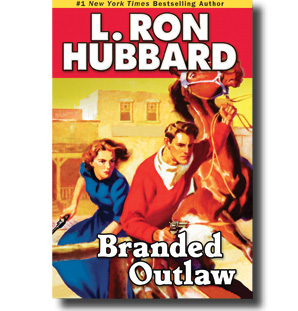
S
unset Maloney, like Alan Ladd as
Shane,
is taking a stand in the middle of a ruthless land grab, finding big trouble in the Big Sky country of Montana. Slim Trotwood is a cruel, greedy tinhornâa gambler with little money and less skillâand Sunset's the only man willing to take him on. Faster than greased lightning with his six-gun, there's nothing can stop him from taking Trotwood down ... until he meets
Tinhorn's Daughter
. Sunset falls hard for her, but if he can't make her see the truth about her father, he may take an even harder fall.
Follow a trail of greed, gun smoke and romance as the audio version of
Tinhorn's Daughter
takes you to the wild heart of the Wild West.
Get
Branded Outlaw
C
ALL
TOLL
-
FREE
: 1-877-8
GALAXY
(1-877-842-5299)
OR GO ONLINE TO
www.goldenagestories.com
Galaxy Press, 7051 Hollywood Blvd., Suite 200, Hollywood, CA 90028
L. Ron Hubbard in the
Golden Age of
Pulp Fiction
Â
I
n writing an adventure story
a writer has to know that he is adventuring
for a lot of people who cannot.
The writer has to take them here and there
about the globe and show them
excitement and love and realism.
As long as that writer is living the part of an
adventurer when he is hammering
the keys, he is succeeding with his story.
Adventuring is a state of mind.
If you adventure through life, you have a
good chance to be a success on paper.
Adventure doesn't mean globe-trotting,
exactly, and it doesn't mean great deeds.
Adventuring is like art.
You have to live it to make it real.
â L. Ron Hubbard
L. Ron Hubbard
and American
Pulp Fiction
B
ORN
March 13, 1911, L. Ron Hubbard lived a life at least as expansive as the stories with which he enthralled a hundred million readers through a fifty-year career.
Originally hailing from Tilden, Nebraska, he spent his formative years in a classically rugged Montana, replete with the cowpunchers, lawmen and desperadoes who would later people his Wild West adventures. And lest anyone imagine those adventures were drawn from vicarious experience, he was not only breaking broncs at a tender age, he was also among the few whites ever admitted into Blackfoot society as a bona fide blood brother. While if only to round out an otherwise rough and tumble youth, his mother was that rarity of her timeâa thoroughly educated womanâwho introduced her son to the classics of Occidental literature even before his seventh birthday.
But as any dedicated L. Ron Hubbard reader will attest, his world extended far beyond Montana. In point of fact, and as the son of a United States naval officer, by the age of eighteen he had traveled over a quarter of a million miles. Included therein were three Pacific crossings to a then still mysterious Asia, where he ran with the likes of Her British Majesty's agent-in-place for North China, and the last in the line of Royal Magicians from the court of Kublai Khan. For the record, L. Ron Hubbard was also among the first Westerners to gain admittance to forbidden Tibetan monasteries below Manchuria, and his photographs of China's Great Wall long graced American geography texts.
Upon his return to the United States and a hasty completion of his interrupted high school education, the young Ron Hubbard entered George Washington University. There, as fans of his aerial adventures may have heard, he earned his wings as a pioneering barnstormer at the dawn of American aviation. He also earned a place in free-flight record books for the longest sustained flight above Chicago. Moreover, as a roving reporter for
Sportsman Pilot
(featuring his first professionally penned articles), he further helped inspire a generation of pilots who would take America to world airpower.
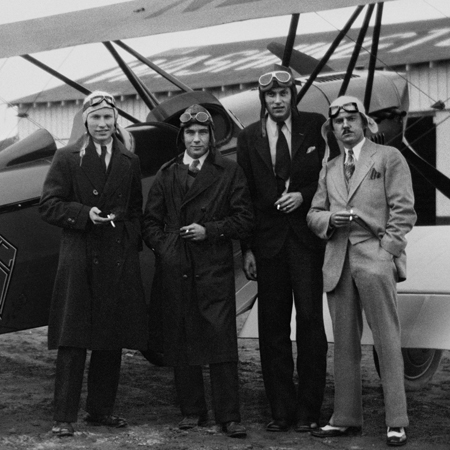
L. Ron Hubbard, left, at Congressional Airport, Washington, DC, 1931, with members of George Washington University flying club.
Immediately beyond his sophomore year, Ron embarked on the first of his famed ethnological expeditions, initially to then untrammeled Caribbean shores (descriptions of which would later fill a whole series of West Indies mystery-thrillers). That the Puerto Rican interior would also figure into the future of Ron Hubbard stories was likewise no accident. For in addition to cultural studies of the island, a 1932â33 LRH expedition is rightly remembered as conducting the first complete mineralogical survey of a Puerto Rico under United States jurisdiction.
There was many another adventure along this vein: As a lifetime member of the famed Explorers Club, L. Ron Hubbard charted North Pacific waters with the first shipboard radio direction finder, and so pioneered a long-range navigation system universally employed until the late twentieth century. While not to put too fine an edge on it, he also held a rare Master Mariner's license to pilot any vessel, of any tonnage in any ocean.
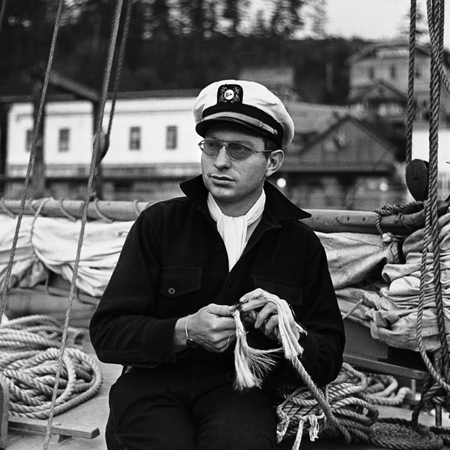
Capt. L. Ron Hubbard in Ketchikan, Alaska, 1940, on his Alaskan Radio Experimental Expedition, the first of three voyages conducted under the Explorers Club Flag.
Yet lest we stray too far afield, there is an LRH note at this juncture in his saga, and it reads in part:
“I started out writing for the pulps, writing the best I knew, writing for every mag on the stands, slanting as well as I could.”
To which one might add: His earliest submissions date from the summer of 1934, and included tales drawn from true-to-life Asian adventures, with characters roughly modeled on British/American intelligence operatives he had known in Shanghai. His early Westerns were similarly peppered with details drawn from personal experience. Although therein lay a first hard lesson from the often cruel world of the pulps. His first Westerns were soundly rejected as lacking the authenticity of a Max Brand yarn (a particularly frustrating comment given L. Ron Hubbard's Westerns came straight from his Montana homeland, while Max Brand was a mediocre New York poet named Frederick Schiller Faust, who turned out implausible six-shooter tales from the terrace of an Italian villa).
Nevertheless, and needless to say, L. Ron Hubbard persevered and soon earned a reputation as among the most publishable names in pulp fiction, with a ninety percent placement rate of first-draft manuscripts. He was also among the most prolific, averaging between seventy and a hundred thousand words a month. Hence the rumors that L. Ron Hubbard had redesigned a typewriter for faster keyboard action and pounded out manuscripts on a continuous roll of butcher paper to save the precious seconds it took to insert a single sheet of paper into manual typewriters of the day.
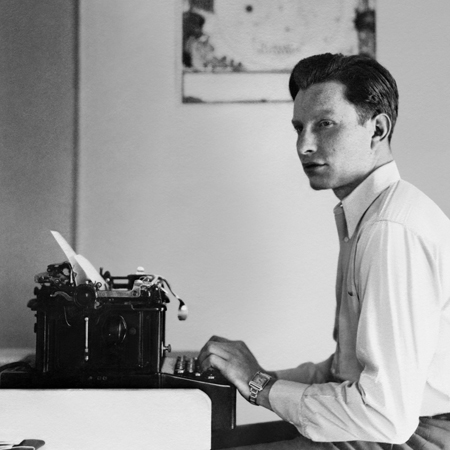
L. Ron Hubbard, circa 1930, at the outset of a literary career that would span half a century.
That all L. Ron Hubbard stories did not run beneath said byline is yet another aspect of pulp fiction lore. That is, as publishers periodically rejected manuscripts from top-drawer authors if only to avoid paying top dollar, L. Ron Hubbard and company just as frequently replied with submissions under various pseudonyms. In Ron's case, the list included: Rene Lafayette, Captain Charles Gordon, Lt. Scott Morgan and the notorious Kurt von Rachenâsupposedly on the lam for a murder rap, while hammering out two-fisted prose in Argentina. The point: While L. Ron Hubbard as Ken Martin spun stories of Southeast Asian intrigue, LRH as Barry Randolph authored tales of romance on the Western rangeâwhich, stretching between a dozen genres is how he came to stand among the two hundred elite authors providing close to a million tales through the glory days of American Pulp Fiction.

A Man of Many Names
Between 1934 and 1950, L. Ron Hubbard authored more than fifteen million words of fiction in more than two hundred classic publications.
To supply his fans and editors with stories across an array of genres and pulp titles, he adopted fifteen pseudonyms in addition to his already renowned L. Ron Hubbard byline.
______
Winchester Remington Colt
Lt. Jonathan Daly
Capt. Charles Gordon
Capt. L. Ron Hubbard
Bernard Hubbel
Michael Keith
Rene Lafayette
Legionnaire 148
Legionnaire 14830
Ken Martin
Scott Morgan
Lt. Scott Morgan
Kurt von Rachen
Barry Randolph
Capt. Humbert Reynolds

In evidence of exactly that, by 1936 L. Ron Hubbard was literally leading pulp fiction's elite as president of New York's American Fiction Guild. Members included a veritable pulp hall of fame: Lester “Doc Savage” Dent, Walter “The Shadow” Gibson, and the legendary Dashiell Hammettâto cite but a few.
Also in evidence of just where L. Ron Hubbard stood within his first two years on the American pulp circuit: By the spring of 1937, he was ensconced in Hollywood, adopting a Caribbean thriller for Columbia Pictures, remembered today as
The Secret of Treasure Island.
Comprising fifteen thirty-minute episodes, the L. Ron Hubbard screenplay led to the most profitable matinée serial in Hollywood history. In accord with Hollywood culture, he was thereafter continually called upon to rewrite/doctor scriptsâmost famously for long-time friend and fellow adventurer Clark Gable.
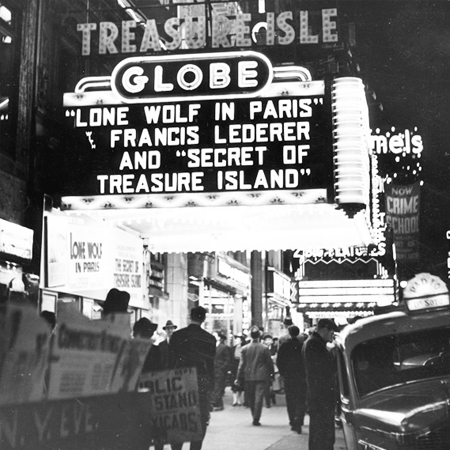
The 1937
Secret of Treasure Island,
a fifteen-episode serial adapted for the screen by L. Ron Hubbard from his novel,
Murder at Pirate Castle
.
In the interimâand herein lies another distinctive chapter of the L. Ron Hubbard storyâhe continually worked to open Pulp Kingdom gates to up-and-coming authors. Or, for that matter, anyone who wished to write. It was a fairly unconventional stance, as markets were already thin and competition razor sharp. But the fact remains, it was an L. Ron Hubbard hallmark that he vehemently lobbied on behalf of young authorsâregularly supplying instructional articles to trade journals, guest-lecturing to short story classes at George Washington University and Harvard, and even founding his own creative writing competition. It was established in 1940, dubbed the Golden Pen, and guaranteed winners both New York representation and publication in
Argosy.